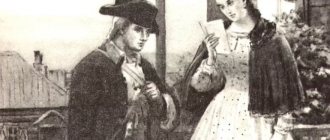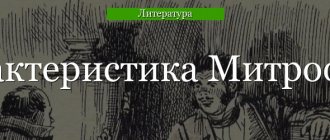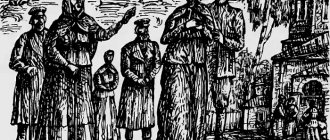Mini-essay: what Pushkin’s fairy tales teach
Pushkin's fairy tales are a whole phenomenon in Russian literature.
The language of his fairy-tale poems is melodious, melodic, and has a special rhythm. It is in tune with Russian folk songs and echoes ancient Russian tales from which the poet drew his plots.
Pushkin's fairy tales introduce readers to Russian culture, traditions, history, and a deep knowledge of the Russian language.
The aesthetics of Alexander Sergeevich’s poetic style evokes pride in his native language and cultivates love for it.
In addition to the cultural and linguistic component, Pushkin’s poetic fairy-tale works cultivate high spiritual qualities in readers and teach them to distinguish between good and evil.
The author praises meekness, good nature and denounces envy, waywardness, and greed.
“In “The Tale of the Dead Princess,” A. S. Pushkin ridicules the cruel, pompous stepmother-queen, whose main occupation is narcissism, and punishes her at the end of the tale.
And the queen laughs, and shrugs her shoulders, and winks her eyes, and clicks her fingers, and spins around, akimbo, looking proudly in the mirror...
But he rewards the meek princess from this work.
In Pushkin's fairy tales, positive characters revere old people and treat their age with understanding.
The old man comes five times because of his wayward old woman with a request for a fish. Each time, the powerful sorceress respectfully and patiently answers him: “What do you want, elder?”
Only the last time the fish, when the old man and the old woman had already gone beyond the limits of what was tolerable, having listened to the request, did not answer anything and swam away.
The dead princess, seeing an old woman in the yard, treated her with sympathy and friendliness:
He sees: a poor bluebird walks around the yard, using her stick to drive away the dog. “Wait, Grandma, wait a little,” she shouts to her through the window, “I’ll threaten the dog myself and I’ll take something away for you...
Love and courage help the heroes of Pushkin's fairy tales overcome obstacles that seem insurmountable to others. The author ridicules and punishes cowardice and cowardice.
The cowardly Farlaf abandoned the search for Lyudmila after an unpleasant meeting with Rogdai and the advice of an unfamiliar old woman:
It is dangerous to travel around the world; You really won’t be happy... Our prudent hero immediately went home...
He is contrasted with Ruslan, whose courage is admirable. Chernomor takes him into the skies, and there they fly for two days:
The sorcerer fell and sat down there; Ruslan, without saying a word, Gets off his horse, hurries towards him, Caught him, grabs him by the beard, The wizard struggles, groans, And suddenly he flies away with Ruslan... The zealous horse looks after him; Already a sorcerer under the clouds; The hero hangs on his beard; They fly over dark forests, They fly over wild mountains, They fly over the abyss of the sea; Growing rigid from the tension, Ruslan stubbornly holds on to the villain’s beard with his hand...
Each character gets what he deserves at the end of the poem. The villain and deceiver Farlaf is a disgrace. Carla loses her magical powers.
The former powerful ruler and sorcerer was left to serve in the palace of Prince Vladimir. The tale does not specify in what position, but it is obvious: he is destined for the role of a jester.
Ruslan again found his beloved wife. He enjoys recognition and glory among his surroundings and people.
Pushkin's fairy tales encourage readers to think about good and evil, their own behavior and life values.
What Alexander Sergeevich sings in his magical poems is also glorified in folk tales.
A person who has absorbed folk wisdom will not choose the wrong road.
Source
What do Pushkin’s fairy tales teach (what are they about and what do they mean to me)
It is difficult to find a person who does not know about Pushkin’s work, who has not read a single poem or passage of prose in his life. The works of this Russian poet are studied at school, his fairy tales are read by mothers to their children. If everything is clear with Pushkin’s poems - experts admire them, lovers learn them by heart, then fairy tales are given special attention. What Pushkin’s fairy tales teach, why they are remarkable and why children like them - these questions should be considered separately.
A. S. Pushkin began to show keen interest in Russian folk tales only in the last decade of his life. For long hours he could sit and write down what his nanny Arina Rodionovna told him. Basically, the material for Pushkin’s fairy tales was exactly what the nanny told, i.e. Russian folk tales passed from mouth to mouth.
A folk tale is not necessarily intended for children. Its most important purpose was to occupy the ears and minds of ordinary peasants on long winter evenings, when they each gathered in the hut with their handicrafts. And A.S. Pushkin wrote his fairy tales for everyone. Surely, he would be surprised if he learned that over time the main readers of his fairy tales would be children. But, of course, Pushkin’s fairy tales are for children!
The current world of Russian childhood is unthinkable without Pushkin's fairy tales. Pushkin is so special to children that when in 1937 in Moscow they wanted to move the poet’s monument from the park to a more illuminated place, the children did not allow it.
Since childhood, the fairy tales of Alexander Sergeevich Pushkin have fascinated us with their brightness, picturesqueness, dynamism, and the unique, original element of the Russian folk language. All of them are brilliantly theatricalized and filmed.
Tyunina Anastasia. Fairytale world of A.S. Pushkin, amazing and magical!
Pushkin's fairy tales have been loved since childhood, not yet knowing that they were written by the great Russian writer and poet Alexander Sergeevich. He wrote in such a way that the fairy tales themselves, without much difficulty, are memorized. They tell a story not only about beautiful princesses, love, positive and negative character traits, but also about actions.
With humor and kindness, he reveals the images of the heroes. Reading and rereading Pushkin’s fairy tales, you perceive them differently each time.
At one time, Alexander Sergeevich listened to stories, old customs, and beliefs of his nanny, of course in prose. He was interested in writing fairy tales in verse and he studied it. Now we enjoy his amazing creations.
The mysterious and wonderful world of fairy tales
What is a fairy tale? Encyclopedias and educated adults will answer that this is a literary genre, folklore, based on fiction. But for any child, a fairy tale is an alluring, wonderful world where animals and birds can speak, where good will always triumph over evil.
According to child psychologists, fairy tales can form in children the concept of good and evil, responsibility for their actions; fairy tales teach children to look for different ways to solve a particular problem. An interesting and fascinating fairy tale can teach a child empathy and will allow him to understand the differences between good and bad actions much faster than a bunch of notations and comments from parents and educators.
For young children, ease of perception of information is very important, and fairy tales written in poetic form attract the child’s attention with the simplicity and colorfulness of their images. Fairy tales by A. S. Pushkin are no exception. They are remembered for a long time and they are the ones that adults remember first when thinking about what to read to their child.
Tyunina Anastasia. Fairytale world of A.S. Pushkin, amazing and magical!
What a delight these tales are! A.S. Pushkin
All children love fairy tales! I love them too! Because, firstly, in fairy tales good always wins and justice triumphs! And, secondly, in fairy tales you can meet amazing fairy-tale characters, miracles and magic!
When I was little, my mother, father or grandmother read and told me fairy tales. Fairy tales teach children that good will always be rewarded and evil will be punished, the brave and honest will win, the patient will wait, and truth will triumph. This is best expressed in folk tales. Experienced feelings together with fairy-tale characters make us kinder and more merciful, braver and stronger. Fairy tales help us cope with fear, overcome our weaknesses and believe in our own strengths.
Wisdom in Pushkin's fairy tales
Fairy tales in Pushkin’s works are not given as much attention as the theme of love or nature. But the images created by the poet are so amazing and realistic that they do not allow you to stop reading and give free rein to your imagination. It is easy for a child to imagine a “learned cat” and a “green oak” and heroes emerging in formation from the waves of the sea.
What do Pushkin's fairy tales teach? First of all, goodness and understanding that any evil will be punished. Each fairy tale exposes human vices and clearly shows what envy, greed, and pride lead to.
The tales of Alexander Sergeevich Pushkin represent the totality of the wisdom and spiritual heritage of the Russian people, a wealth of original plots. Pushkin's fairy tales are based on Russian folk tales, folklore tales, songs, and epics. Pushkin’s works for children have a huge impact on their emotional development, develop imagination and erudition, as they expand their vocabulary and cultivate the best moral qualities.
When to start introducing children to Pushkin's fairy tales?
It is recommended to start getting acquainted with the fairy tales of the great Russian poet at the age of two.
During this period, the child develops a conscious perception of the world, he absorbs new information and remembers it. Kids will be interested in the heroes of Pushkin's fairy tales and the events taking place around them. A little later, at an older age, an understanding will come of why troubles happen to certain heroes and how they manage to get out of difficult situations.
To begin with, it is enough to read Pushkin to a child for 10-15 minutes, for example, excerpts from “The Tale of Tsar Saltan. ” about a squirrel or a boat. Then scenes with 33 heroes, who are so colorfully described by the author. Children will be able to vividly imagine these courageous heroes “in their scales, like the heat of grief.” One cannot ignore the famous “At the Lukomorye”, where numerous fairy-tale characters are collected. The child will meet them in other fairy tales.
The older the child becomes, the more meaningful his perception of the text becomes. At 3 years old, a child is quite capable of discussing the behavior of an evil old woman, an unfortunate old man or King Guidon, and showing sympathy for the poor princess, so it is important to ask the child to express his opinion about what he read, which will contribute to the development of his speech skills.
All Pushkin's fairy tales are also available for children in an animated version. You can watch them with your child, but how much more interesting it is to read these amazing stories and give the child the opportunity to imagine what the main characters look like and what surrounded them.
What to pay attention to when reading Pushkin's fairy tales?
The most famous and popular are 5 fairy tales by Pushkin. These are quite voluminous works, and they should not be read in full at once, but must be read chapter by chapter, in the order in which the author distributed them. Thus, the child develops not only attentiveness, but also cause-and-effect relationships.
Reading fairy tales should be expressive and emotional, which will help the child form his own attitude towards the characters and plot events of the fairy tale.
“The Tale of the Priest and His Worker Balda”
You have to pay for everything, no matter how much the greedy and rich would like to do otherwise.
“The Tale of the Fisherman and the Fish”
Pushkin described how bad and dear it is to be greedy in “The Tale of the Fisherman and the Fish.” On the one hand, the Old Man's compassion towards the fish is rewarded and, on the other hand, his wife's greed is rightly punished. No matter how much one would like to quickly go from the “broken trough” to the “mistress of the sea,” this cannot be done at the behest of the Golden Fish.
Pushkin taught a great lesson about how easy it is to lose everything by succumbing to stupidity and greed.
Here is an ideal family: the old man fishes, the old woman spins yarn, both are content with whatever God sends. But then God sends a test: a goldfish that can fulfill any desire. The old man is surprised, scared, he lets go of the goldfish, because he is selfless. But with his lack of will and weak character, the old man allows the old woman’s pride to swell so much that she ultimately wants to become the “mistress of the sea,” consider God himself. It swelled like a bubble and burst. The old man does not stand the test of the old woman’s imperious character, the old woman does not stand the test of the miracle. And both end up with nothing.
A child will probably remember the phraseological phrase “broken trough” more than once in his life.
"The Tale of Tsar Saltan"
“The Tale of Tsar Saltan” is the most magical, the most enchanting of all Pushkin’s fairy tales. Miracles in it simply follow one after another like fireworks. But the most interesting thing is that it contains echoes of historical legends, the keeper of which was Arina Rodionovna. Pushkin's nanny was from the Russian North, where legends about Kievan Rus were still remembered. The saying “past the island of Buyan to the kingdom of the glorious Saltan” describes the ancient trade route from the Varangians to the Greeks. The inhabitants of the Russian North, the Pomors, kept in their legends the memory of the island of Rügen, the largest in the Baltic Sea, which belonged to the Germans. Before the Germans, Rugs or Rus lived here. The island was once called Ruyan. The island ceased to be Russian when the Russian princely dynasty ended in the 13th century. Subsequently, the island was Danish and Swedish. But the inhabitants of the Russian North preserved the memory of the island in folklore. The name Ruyan was transformed into Buyan.
This fairy tale by Pushkin for children begins with the fact that the Tsar Father, walking on Epiphany Eve, overhears a conversation between three girls about what each of them would do if they became the Tsar’s wife. Tsar Saltan liked the words of the third maiden that she would give birth to a hero for the Tsar. In traditional society, both tribal and Christian, childbirth was considered a basic value, in no way comparable to the value of feasts or precious garments.
Essay on what Pushkin’s fairy tales taught me
5 options
What do Pushkin's fairy tales teach?
First of all, goodness and understanding that any evil will be punished. Each fairy tale exposes human vices and clearly shows what envy, greed, and pride lead to. • “The Tale of the Priest and His Worker Balda.” The resourcefulness and hard work of an ordinary village peasant is contrasted with the greed of a priest who wanted to get himself a free worker. “If you don’t chase after cheap prices,” Pushkin expressed the whole meaning of the fairy tale in this phrase. You have to pay for everything, no matter how much the greedy and rich would like to do otherwise. • Pushkin described that it is bad to be greedy in “The Tale of the Fisherman and the Fish.” On the one hand, the Old Man's compassion towards the fish is rewarded and, on the other hand, his wife's greed is rightly punished. No matter how much one would like to quickly go from the “broken trough” to the “mistress of the sea”, this cannot be done at the behest of the “Golden Fish”. Pushkin taught a great lesson about how easy it is to lose everything by succumbing to stupidity and greed. • "The Tale of Tsar Saltan". The envy and lies of Babarikha’s sisters and grandmother led to suffering and difficulties for the queen and her son, but, as it should be in a fairy tale for Pushkin’s children, love and forgiveness win. You shouldn’t take anyone’s word for it, because the evil thoughts of enemies can ruin your life and bring into it many unpleasant and wrong decisions. Pushkin
– all essays I really like reading fairy tales. Kind, cheerful and instructive, they become our friends and advisers in various difficult situations for many years. Through their actions, fairy-tale heroes help us learn to distinguish good from evil, truth from lies, and become honest, brave, and just. “The Tale of the Dead Princess and the Seven Knights,” written by A. S. Pushkin, takes us to the times of kings and queens, heroes and magic mirrors. However, even here, within the walls of a rich palace, envy and jealousy, malice and hypocrisy live. The young beautiful princess, left without a mother, experienced a lot of grief and misfortune. However, purity of soul, tolerance, loyalty to her given word and feeling, kindness and hard work helped her overcome all the machinations of her evil and treacherous stepmother and wait for her happiness. This fairy tale teaches us that miracles in the world occur not only thanks to magic and witchcraft. A person can make the best, most interesting and most truthful fairy tale come true only on his own, because a kind heart and faith in the best are the most powerful magicians.
Why do I love A. S. Pushkin’s fairy tale “About the Fisherman and the Fish”? I really like reading fairy tales. I especially like the fairy tales of A.S. Pushkin. Why? Not just because they are interesting. I like that they are written in beautiful poetry. “The Tale of the Fisherman and the Fish” had an indelible impression on me. It tells the story of how a poor old man caught a goldfish. She was magical and could make any wish come true. The old man had a very angry and greedy old woman. He submitted to her will, went to the sea and asked the fish to fulfill all her wishes. The old woman was dissatisfied with everything, scolded and called the old man names. He had no respect for her, no matter how high she rose. This is evidenced by his address to her when she wanted to become a queen: “What are you, woman, have you eaten too much henbane?” And she became a queen, but she didn’t want her to stay. She sent the old man to the fish and said: “Come back, bow to the fish. I don’t want to be a free queen, I want to be the mistress of the sea, so that I can live in the Okiyan sea, so that a golden fish can serve me and be on my errands.” Only the fish did not want to serve the old woman and returned her the dugout and the broken trough. This fairy tale taught me to be a generous person, never to be stingy and to know in moderation in everything. Branch of MBOU Secondary School with. Terbuny in the village. Berezovka Essay on the topic: “Why I love A. S. Pushkin’s fairy tale “About the Fisherman and the Fish” Prepared by 3rd grade student Igor Poltev, 2013 – 2014 school year. year
gold fish
I love reading fairy tales, because incredible adventures happen to the characters in them. If you read them carefully, you can understand a lot, learn a lot. Wisdom and justice are hidden in fairy tales.
I like A. Pushkin's fairy tale about the goldfish. When you read it, you experience different emotions. At the beginning of the fairy tale, you are happy for the old man, because he was lucky to catch an amazing fish that fulfilled any wishes. Then you observe the ever-increasing demands of the old woman, demanding the fulfillment of new desires. And you also wait with interest for when the goldfish will run out of patience and teach the old woman a lesson.
The characters in the tale are very different. The old man is kind and simple-minded, he obeys his wife’s orders and indulges her in every possible way. I feel sorry for him because he is unlucky to live with such a shrewish woman. The old man did not have the courage or cunning to ask the fish for anything for himself, at least a new net. He felt sorry and simply let the goldfish go, as he was used to working and being happy with what he had.
The old woman is completely different. Having asked for a new trough, she did not stop at one desire, but began to demand more and more. The house received, the courtiers and the benefits bestowed on the fish do not make it happy. On the contrary, they only strengthen negative qualities: arrogance, greed, cruelty and ingratitude. The old woman not only demands that the fish fulfill his whims, but also drives away the old man who caught the magic fish.
The fish is a wise and patient character. She fulfills wishes and observes the changes in the old woman. When she wanted to become the mistress of the sea, the fish decides to show the old woman her place and returns her to the broken trough.
The fairy tale teaches that you need to correctly assess your desires and needs. And also that you need to be able to be content with little, be happy with what you have, and be grateful.
Essay 3
The work teaches that parents should always be honored, and not only when they are no longer around. However, many people still regard parental love and care as something self-evident and do not notice what their parents do for them. Only when mothers and fathers die, and their children miss them, then, as a rule, there are opportunities, means and a desire to see each other. But time cannot be turned back, and people cannot be resurrected.
Samson Vyrin reaches out to Duna with all his soul. But when she meets a man and falls in love with him, she leaves home and leaves him alone. On the one hand, the father wishes his daughter happiness, but he is very burdened by the fact that he does not know how she is doing - the girl does not even bother to write him letters. However, the hero does not give up trying to meet her. But when he finds his daughter, he is simply kicked out of the door. Vyrin never managed to see Dunya. She came to his grave and sincerely lamented that she would never see her father again.
No, the girl cannot be called a negative heroine. However, the creation itself can be considered instructive. Often people don’t even fully understand how much they owe to their parents (after all, they do so much for them). As for children, they are often selfish - few people understand what every parent's tear and every effort really means.
We can say that, using the example of Samson and Dunya, the author gives an opportunity to think about the importance of parents in a person’s life, the ingratitude of children and many other things that are undoubtedly very important, if not fundamental.
I think that after reading the story, it would be a good idea for everyone to come up and once again hug their parents, smile at them, and say a kind word. After all, they are the highest value given by God. It’s a pity that Dunya realized this too late. It is quite possible that she did not hold any grudge against her father, but she did not pay him due attention. And this attention was very important to him, he was drawn to her without reciprocity.
This is the greatest tragedy of the story. What people have they don’t value. And they only pay when they lose it. And so it was and will be from time immemorial. Almost always, when children grow up, moms and dads fade into the background. It is painful and offensive, but inevitable - and this stage begins with the beginning of the child’s personal life. Nevertheless, even being married and far away, we must not forget about those who gave life and nurtured, who invested their soul and correct understanding of life.
The Tale of Tsar Saltan
My favorite fairy tale by A.S. Pushkin is “The Tale of Tsar Saltan...”. Like many of the writer’s fairy tales, it is distinguished by its melodiousness, close to folklore.
The fairy tale begins with the beginning: three girls spin yarn under the window, and each talks about her dreams. It so happened that the king heard their conversation. The speeches of the last younger sister pleased him so much that he took her as his wife. And he made the other two sisters a weaver and a cook. In Pushkin's fairy tale, Tsar Saltan has such important qualities for a person as kindness, wisdom, and honesty. But also, probably, a negative quality of the hero is excessive gullibility: while at war, the weaver and the cook send the king a letter in which they say that his queen gave birth not to a hero, but to an unknown animal. Believing them, Saltan sends a letter in which he says that the courtiers should wait for his decision. But the evil sisters intercept the letter and send a new one, with the help of which they get rid of the queen: they wall her up in a barrel with her son and throw her into the sea.
Then the magical actions of the fairy tale begin. The barrel is thrown ashore, and Gvidon grows by leaps and bounds, and soon squeezes out the bottom of the barrel. So he and his mother find themselves free. Hungry, the young prince makes a bow and arrows and goes hunting. There he saves the beautiful Swan Princess from the evil Kite. The princess, in gratitude, gives Guidon a kingdom, which he rules with honor and kindness.
Essay My favorite fairy tale About the fisherman and the fish by Pushkin
I like to read about various fictional and fairy-tale characters. In the fairy tale “About the Fisherman and the Fish,” the main character is the Goldfish. She is endowed with magical powers and can make any desire come true. A situation occurs that she gets caught in the net and cannot free herself. As a payoff, she negotiates with the old man and offers to fulfill any of his wishes. The old man asks for nothing in return. Arriving home, he listens to his wife. And he carries out her orders. He asks the fish for a new trough. Afterwards, the old woman realizes that everything is serious and begins to make more complex wishes. The poor fish, feeling sorry for the old man, fulfills all his wishes. Her patience ends when the “Queen” wants the Goldfish herself to be her maidservant.
In the plot of the fairy tale there are three main characters: a kind, hardworking old man; a domineering, rude and immoderate old woman; patron - a magic fish.
The old man works throughout the tale, eats the results of his labor and does not complain about his fate. There's a lot of humility in him. This man is used to serving and obeying his wife in everything. He goes around begging for better living conditions for her. And he himself lives in poverty and with poor health, respectable age. He continues his difficult work and does not think about the fact that he, too, could have wished for servants and a peaceful old age.
After reading the entire work, we need to think. The fairy tale has a huge meaning. The fish silently fulfills any demands of the old woman, but cannot withstand the last order. We need to look at life situations realistically. Set realistic goals. Otherwise, anger will fall on the part of your patron (benefactor) and all benefits will be destroyed.
The Tale of the Dead Princess
Alexander Sergeevich Pushkin is a famous Russian writer, poet and playwright. He wrote a large number of children's educational tales, poems and poems. One of his works is “The Tale of the Dead Princess and the Seven Knights.” The author shows how evil and envy bring trouble to all people around.
Having asked the mirror the same question again, the queen finds out that her stepdaughter is alive. Then she tries for the second time to carry out her insidious plan in the guise of an old woman and she succeeds. Arriving at the house, she offers the princess an apple soaked in poison, after biting which the girl falls asleep. This becomes a great grief for everyone. The heroes put the girl in a crystal coffin, which hangs on chains in the cave.
Fortunately, this story ended well, good defeated evil. The prince, who persistently searched for the princess, saved her by breaking the coffin out of sadness. The princess and the prince return to the castle and have a wedding, and the stepmother, again realizing that the princess is more beautiful than her, dies of anger. I like this fairy tale, it shows how the negative qualities of one person affect other people. You need to be kind and not envious, because many troubles occur due to bad deeds.
Essay on the topic: Fairy tales of Pushkin
Alexander Pushkin wrote many wonderful fairy tales for children. Fairy tales are mostly poetic, so they are easy to read. Here we are on the seashore of the fairy tale “About the Fisherman and the Fish.” The goldfish fulfills the wishes of the stifled grandmother. The fairy tale teaches us not to encroach on great wealth, so as not to end up with nothing. And what a wonderful forest in the poem “Ruslan and Lyudmila”. Here you can meet a learned cat, a mermaid, thirty sea knights, their uncle Chernomor, see Baba Yaga’s hut on a chicken leg, the evil Koshchei the Immortal, traces of unprecedented animals. Now we are in the royal chambers. This is "The Tale of the Dead Princess and the Seven Knights." Neither the mirror, which knew everything in the world, nor deceit, nor envy and cunning helped the evil queen to get rid of the young beautiful princess. A girl's kind heart helps her find friends, and love conquers all spells. Again we return to the shore of another sea in the fairy tale “About Tsar Saltan...”, where the waves threw a barrel onto the shore. And in it the king’s young son Guidon and his queen mother were saved. There, the prince saves not a swan from a kite, but a beautiful girl from an evil wizard. Small insects fly three times to see their home. There he learns that all the wonders of the world are very close. The old king also wants to see them. Subsequently, the whole truth about the terrible act is revealed, and the perpetrators are punished. This interesting journey can continue for a long time. Pushkin wrote many fairy tales. They are all different in plot, interesting and instructive.
Did Hamlet love Ophelia?
This question constantly arises when reading the tragedy, but has no answer in its plot, in which the characters’ relationships are not built as love ones. They are expressed by other motives: Ophelia’s paternal prohibition to accept Hamlet’s heartfelt outpourings and her obedience to her parental will; Hamlet's love desperation, prompted by his role as a madman; the genuine madness of Ophelia, through which the words of songs break through memories of what happened, or what did not happen between them. If the love of Ophelia and Hamlet exists, then only a wonderful and unrealized opportunity, outlined before the beginning of the plot and destroyed







